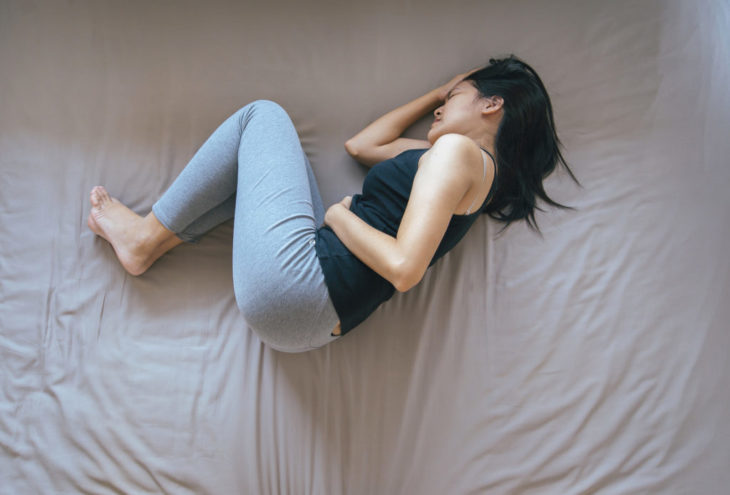Here we go again, it all starts slowly and as you start to wake up in the comfort of your bed, you feel that familiar sensation. Its that day of the month. Even today, in the 21st century we have still difficulties talking openly about it and many women feel bad or ashamed. This is a naturally occurring process and it is time to put a stop to the stigma surrounding it.
Additionally, many women experience different symptoms and it is good to know how to overcome these obstacles and not allow it to interfere with your daily activities.
Contents
1. Be prepared

Source: Girlmentum
Most women know around which date their period will come so they are prepared for it in means of having a pad or a tampon on them; some as well plan their wardrobe and avoid wearing light-colored trousers or skirts in order to avoid possible accidents.
Some women have irregular periods and they, unfortunately, don’t know when the lightning will strike. One of the best advice is to stay relaxed, listen to your body and have all the necessary products on you; this means tampon and/or a pad and wet wipes. There are some women that always have one pair of underwear in their bag, just in case.
Being well prepared is a good way of preventing unpleasant moments that can occur. As technology makes progress, there are a lot of apps that can be used to track the cycle, and some are specially designed to recognize the patterns and predict even the most irregular cycles. This can take the pressure of thinking about when will it happen.
2. Manage the pain

Source: Still Osteopathic Clinics
Mild pain during the period is completely normal due to a few physical changes that occur. Due to hormonal fluctuations lower backbones and bones of the pelvis move apart for up to 8mm and this can cause lower back and pelvic pain. The hormone relaxin is the one to blame for this. In addition, in order to expel the content of it, the uterus contracts and these contractions can cause mild comport or low-level pain. In these cases, non-steroid anti-inflammatory drugs or NSAIDs are commonly used to relieve the pain in their days. Most women have these on them at all times.
There’s a common misconception that exercises can increase the pain and that during the period no exercises should be done. Mild exercises can help lower down the pain and relax the muscles increasing natural substances that relieve the pain. Swimming can be a good exercise and it can lower the impact on the lower back, so if you can, do not skip or add this into the routine.
3. Know when to call a doctor

Source: Naturally Daily
Mild pain and discomfort are fine, but the period should never interfere with your daily activities. There are a few symptoms you should pay attention to severe pain, vomiting, nausea, fainting and, heavy bleeding. Some cycles will be characterized by more and some with fewer amounts of blood, but if this amount is greater than it was before, and you need to change the tampon or a pad after less than two hours, it might be a time to consult a doctor. The same goes for pain. The truth is that not all women have the same pain threshold, but if this pain is severe, and it causes nausea, vomiting and/ or fainting, refer to the medical practitioner.
When it comes to this matter it is good to have someone who will listen to you, someone you can trust and provide you with advice in a short period of time. If you are feeling unwell, you can try Yourdoctors.Online, have a quick consultation and have all questions answered.
4. Manage your emotions

Source: Net
As hormones fluctuate, emotions are there to follow. Most women feel very weepy, irritable or overall emotional. This is completely normal, but since you need to maintain your daily routine, there is something you can try in order not to get overwhelmed. In these cases some breathing exercises will help out, also, it is always good to take a few minutes off and just let it all sink in.
Most women stated that exercises, yoga, meditation can help with maintaining calmness during these days. In addition, it is known that chocolate increases serotonin, but be very aware that this can be a trap, and you might end up eating the whole thing and feeling worse than better. In this case, try buying a small, dark chocolate bar, that is low in sugar, in order to boost up the serotonin levels, and maintaining low sugar ones.
5. Additional Tips and tricks

Source: Ruby Love
Over the years, we hear a lot and a lot of advice on how to survive these days.
For starters, it is always good to listen to your body. Some studies have shown that an increase in Calcium levels can ease the symptoms of PMS, and truly some females have stated that they do have an increased desire for products that contain calcium such as milk, cheese, yogurt, and kefir.
On the other hand, some females do not take medications to relieve pain, but heating pads, which are proven to lower down the amount of pain that is being felt.
Make sure to drink enough water during this period in order to replenish the fluids lost.
There can come to the changes into bowel movement, in the sense that it can increase due to the relaxins produced by the body and the uterine contractions. Some females, on the other hand, experience congestion which they can overcome by increasing amounts of fluids and fiber.
Conclusion
There is nothing shameful in the natural cycle that occurs every month. With simple tricks and tips mentioned above, you will go through these days with less or no anxiety and enjoy every day of your life. Be kind to yourself and your body, allow it to heal and let it rest when needed. Once your monthly cycle starts to interfere with your daily activities and makes you skip or change plans it is time to consult the doctor.
